‘Always remember that we are innocent’: A son’s fight to clear his mother’s name
Robert Meeropol is pushing for his mother to be exonerated by the US government, which famously executed his parents for passing nuclear secrets to the USSR
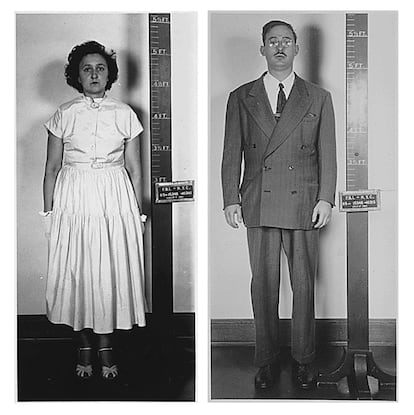

Friday June 19, 1953 was a suffocating, humid day in New York. Robert and his brother Michael were at a friend’s house. That afternoon, they were allowed to play in the garden until they lost sight of their ball in the dark – not because they had earned it, but out of mercy: their parents, Julius and Ethel Rosenberg, were killed by electric chair that day in Sing Sing jail. The execution started one minute before sunset, which marks the start of Shabbat. The US government killed the pair, who were wrongly accused of participating in a plot to steal the secrets behind the atomic bomb for the Soviet Union, and at least they took care not to break Jewish law. Robert, who was six years old, did not hear the news immediately. He did not yet know what it meant to die. His older brother, Michael, 10, told him after a week, “Mom and Dad are not coming home.”

Today, Robert is a retired lawyer, a 74-year-old leftist with manners and principles from another era. In 2003, the 50th anniversary of his tragedy, he wrote An Execution in the Family. The memoirs offer valuable testimony of one of the most infamous episodes of the Cold War. They are political history of the United States from the perspective of a marked man. A new edition includes an afterword in which the author reflects on the last 19 years. “I took that book as the opportunity to finally tell my story and to publicize my foundation, which since 1990 has helped the children of imprisoned activists in the United States,” explains Robert on a video call from his home in Northampton, Massachusetts.
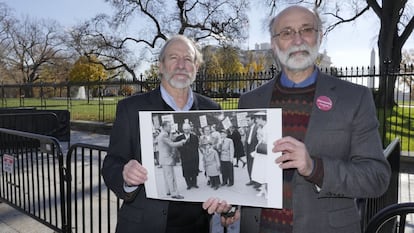
A lot has happened in these two decades. The case is not closed. After the deaths of the main prosecution witnesses, Ethel’s brother and sister-in-law David and Ruth Greenglass, who died in 2014 and 2008, respectively, the last secret documents were revealed. They led Robert into a fight for the exoneration of his mother that has now lasted seven years. And now, 69 years after his parents’ deaths, Robert says he is considering “demanding that material about the case that is not yet public be released.”
The Rosenberg execution was the only case of the United States using capital punishment for conspiracy to commit espionage during peacetime. Afterwards, the two boys grew up as anonymous victims of history. Married couple Abel and Anne Meeropol, Jewish leftists unrelated to their biological parents, gave them a home when even members of their own family refused to take them in. The boys changed their last name to Meeropol, which they still keep. Until 20 years later, they rarely shared their true identities.
In the summer of 1950, the Korean War had just begun, and Stalin had had his atomic bomb since the previous year. Washington found only one possible explanation: that they had been robbed of the best-kept secret in military history. Senator Joseph McCarthy was pointing to American communists as the great domestic threat. And the Rosenbergs had embraced Marxism in the late 1930s. On the night the police broke into the Rosenbergs’ apartment on the Lower East Side New York looking for Julius, little Robert was sleeping, and Michael was listening to an episode of The Lone Ranger on the radio.
Julius was taken away that night and charged with conspiracy to commit espionage. A month later, they came for Ethel. The nuance of the conspiracy charge is important to Meeropol: “It is easier to prove than espionage itself. It suffices, for example, to prove that there was a phone call.” In June, Ethel’s brother, David Greenglass, also a communist, had been arrested on the same charges. He had worked for 18 months as a machinist for the army at the Los Alamos project in New Mexico, where a team led by Robert Oppenheimer invented the atomic bomb at the end of World War II. The FBI saw Greenglass as part of a plot to send nuclear secrets to Moscow. To lessen his prison time (he was sentenced to 15 years, and served only nine) and to save his wife, Greenglass admitted his guilt and ratted out his sister and brother-in-law.
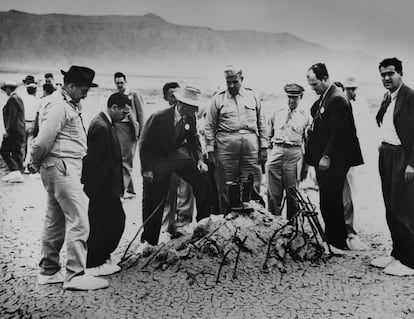
The trial was plagued by contradictory testimonies and other irregularities. The jury was under enormous pressure. They were led to believe that they were the last line of defense for the American way of life. The accusations against Ethel were particularly flimsy: that she was present at meetings to commit espionage and that she typed David’s handwritten notes describing the bomb. Yet the sentence describes her as a woman who, at 37 years old, put communism before her two children. She was portrayed as a sinister ringleader, all because she was three years older than her husband.
The case involved a series of questionable characters: witness Harry Gold, a chemist later found to be a compulsive liar; aggressive deputy prosecutor Roy Cohn, one of the most sinister characters in the McCarthyism witch hunt; and a host of officials, including J. Edgar Hoover, who decided to move forward despite their doubts. When the trial ended, 70% of Americans, influenced by the media coverage, believed that the couple deserved to die.
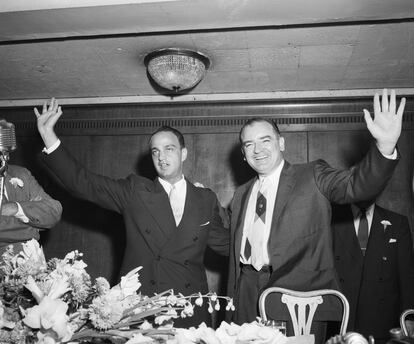
That execution has cast a long shadow over American culture to this day. It has inspired nearly as many books as Kennedy’s assassination. The Rosenberg are everywhere. They appear in Tony Kushner’s play “Angels in America,” which HBO adapted for television in 2003 with Meryl Streep playing Ethel’s ghost. Sylvia Plath’s novel “The Bell Jar” has this famous opening: “It was a queer, sultry summer, the summer they electrocuted the Rosenbergs, and I didn’t know what I was doing in New York.” The boys’ adoptive family also brings a pop culture pedigree: Abel Meeropol is the author of “Strange Fruit,” the anti-lynching anthem popularized by jazz singer Billie Holiday.
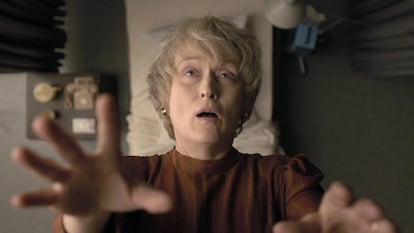
Two years after that, in 1973, the local press found the children and yanked them out of anonymity. The following year, they published “We Are Your Sons,” a compilation of their own writings and one hundred letters that their parents wrote in prison. The brothers also sued the FBI and the CIA to obtain the declassification of 300,000 documents about the process of their parents, which set a historical precedent in the application of the Freedom of Information Law.
The children of the Rosenbergs once again, they spent the following decades doing what their mother asked in her last letter from prison, three days after they last saw each other at Sing Sing: “Always remember that we are innocent.”
And then, in 1995, they declassified the Venona project papers.
Venona was created in 1943 out of the distrust of the United States about the true intentions of the USSR, its ally against Hitler with whom Stalin had signed the Ribbentrop-Molotov non-aggression pact in 1939. The program sought to decipher the code messages exchanged with the Soviet consulate in New York with a double-encrypted code, theoretically impossible to break. Those papers showed that Moscow had some 350 spies in the United States, Julius Rosenberg and David and Ruth Greenglass among them. All three had code names: Antenna, Caliber and Wasp. Ethel was mentioned in the cables, but she had no aliases. That, together with the fact that one of the cables says that she “does not work,” came to prove that Russia did not consider her an active agent.
“There, it became clear to us that my father was engaged in military industrial espionage,” recalls Meeropol. “And to understand what that means, we have to travel back in time, to the 1940s, when all the country’s industries were militarized. He was not a James Bond. He simply passed on data on the construction of aircraft, electronics or radars, and he provided secret information to the USSR to defeat the Nazis. I had no idea about the atomic bomb. I’m pretty sure my mom was aware of it, but she wasn’t actively involved. I think it’s clear that they agreed on it so she could stay home and take care of us.”
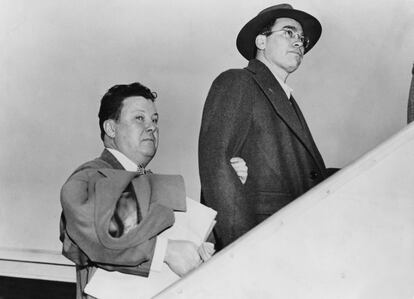
In 2008, Julius’s college classmate Morton Sobell, who was also convicted and spent 30 years on Alcatraz, admitted in an interview with The New York Times that Ethel was was a spy, but she didn’t pass any secrets about the bomb. He claimed that the woman “knew what her husband was doing” but was guilty only of “being his wife.” “It’s clear that she knew, but not how much she knew,” explains British historian Anne Sebba, author of “Ethel Rosenberg: An American Tragedy” (St. Martin’s Press, 2021), a book that for the first time treats her as an individual and not just as part of the iconic couple. “Be that as it may, it is not a crime to be aware of what your husband is doing, nor to believe in it. Her brother said that he had seen her typing, but on his release from prison he admitted that he had lied about it.”
Could Julius have saved his wife? “The government’s purpose was to prove that it had stolen the secret of the atomic bomb,” Meeropol says. “They were asking him to admit to something he didn’t do and to blame his comrades for something they didn’t do. Neither of my parents would have been capable of such a thing. And my mother? She would never have betrayed Julius. She was not like her sister-in-law.” Meeropol says that 69 years later he is still not ready to give his aunt and uncle for informing. He never contacted them.
Sebba, for her part, is not “sure that her husband could have done much for her.” “He did not know that the FBI handled information on Venona, so he was not aware that they had evidence against him. And he believed that the best way out of that was to remain innocent. They were determined to convict him because they knew he was a spy. And once Ethel was indicted, they couldn’t back down, even though the attorney general called that decision a bluff.”
The last elements of the Meeropol’s picture so far come from the Greenglass’s testimony before the Grand Jury. They are confidential under US law and were only made public after the couple’s deaths. The documents prove that the people who implicated her mother had not said anything about her in the previous investigations. Only later, when Ruth changed her mind, did they agree to incriminate her so as not to contradict each other and thus be saved. That, at a minimum, proves that the case was built on perjury.
Since 2015, the Meeropols have sought to extricate their mother’s case from her father’s in order to exonerate her. Their campaign began with Obama in the White House, and was suspended when Donald Trump took power: one of the former president’s great mentors was Roy Cohn, the deputy prosecutor who worked fiercely to send the couple to the electric chair. For Meeropol, who trusts that things will go better with Joe Biden–although he understands that there are “more urgent matters”--the nuance of the exoneration is important. It is not simply a lawyer’s obsession: “It is not enough that they pardon her,” he says. “You forgive a person who is guilty, but she wasn’t. We want to clear her name.”
Almost 70 years later, the brothers are no longer those children playing ball in the garden. The moment for justice is running out. “There is no turning back from an execution,” explains Meeropol, “and the death penalty system is built on the idea of its infallibility. Admitting there was a mistake undermines the system itself.”
Tu suscripción se está usando en otro dispositivo
¿Quieres añadir otro usuario a tu suscripción?
Si continúas leyendo en este dispositivo, no se podrá leer en el otro.
FlechaTu suscripción se está usando en otro dispositivo y solo puedes acceder a EL PAÍS desde un dispositivo a la vez.
Si quieres compartir tu cuenta, cambia tu suscripción a la modalidad Premium, así podrás añadir otro usuario. Cada uno accederá con su propia cuenta de email, lo que os permitirá personalizar vuestra experiencia en EL PAÍS.
¿Tienes una suscripción de empresa? Accede aquí para contratar más cuentas.
En el caso de no saber quién está usando tu cuenta, te recomendamos cambiar tu contraseña aquí.
Si decides continuar compartiendo tu cuenta, este mensaje se mostrará en tu dispositivo y en el de la otra persona que está usando tu cuenta de forma indefinida, afectando a tu experiencia de lectura. Puedes consultar aquí los términos y condiciones de la suscripción digital.








































